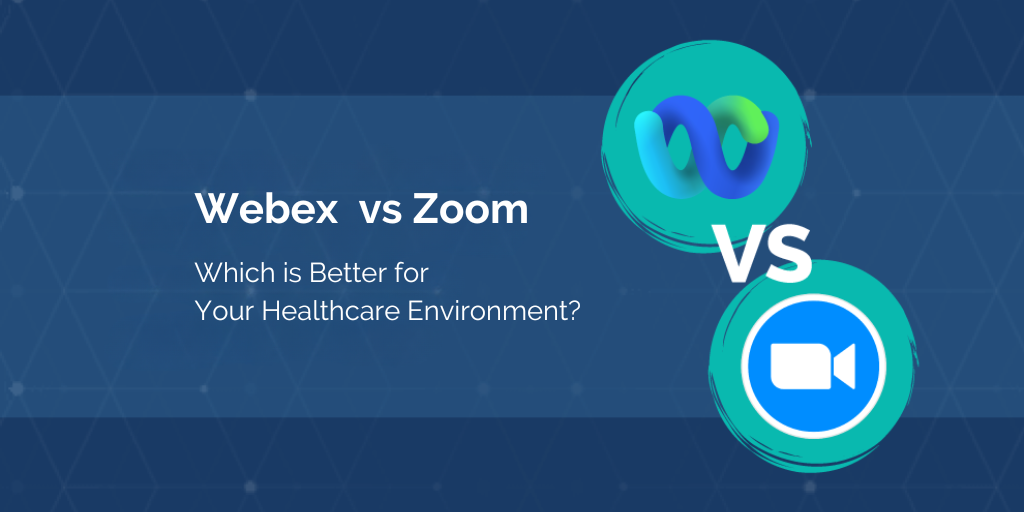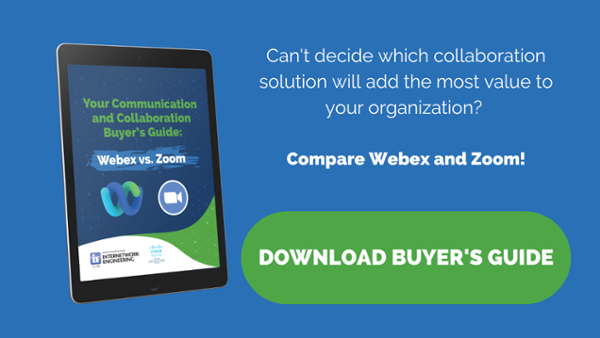Webex vs. Zoom: Which is Better for Your Healthcare Environment?
It’s no secret that historically in-person meetings are now being moved online, and patient appointments are no exception. Whether you’re communicating with hospital staff, or hosting a secure Telehealth appointment, you need a collaboration solution that provides a reliably secure and intuitive experience. Webex and Zoom are a few of the most prominent collaboration solutions we’ve seen in healthcare environments.
In this blog we’ll compare Webex and Zoom on their:
- Security and HIPAA Compliance
- Additional Features
- EHR/EMR & Telehealth Platform Integrations
- Pricing/Value for Money
Let’s get started!
Security and HIPAA Compliance
Healthcare requires rigorous HIPAA standards because of the handling of sensitive patient data. Therefore, platforms with reliable security are an essential component of any healthcare system.
Arguably one of the most important facets to consider with conferencing solutions in the healthcare space is their use of Telehealth. As this is a customer facing system that incorporates patient data, and requires a secure solution to maintain patient privacy, a secure collaboration solution with a proven track record of stability is ideal. While in recent years Zoom has made vast improvements in the security of their conferencing solution, past exploits such as Zoom bombs and overseas based servers that require un-encrypting patient data are still prominent in customer’s minds and do not encourage a peace-of-mind feeling.
Past security concerns aside, Webex also offers its users more control over security. A few examples of this include the ability to require passwords or restrict access to meetings. Both of these options are essential for maintaining patient privacy.
On the other hand, Webex has a continuous record of reliable security and HIPAA compliance. They have always offered end to end encryption with servers based in the US for optimal security. There are many other industries that would get along fine with Zoom and where they stand now with their security, however, when dealing with ever looming, strict HIPAA regulations (and the substantial fines that come with breaching those regulations), healthcare professionals would likely experience better peace of mind with a solution that’s proven itself in that department time and time again.
Winner: Webex
Additional Features
For this comparison, we’ve rounded up some of the top features we believe are most beneficial to Healthcare.
|
Webex |
Zoom |
|
|
|
Telehealth capabilities:
|
Telehealth capabilities:
|
|
|
|
Screen sharing: allows healthcare professionals to share medical images, documents, and other relevant information during a video conference.
Meeting Recording: Webex offers more control over the recording process, including the ability to pause and resume recordings and to record only certain participants. Meeting hosts can also limit which attendees have the ability to record.
|
Screen Sharing: allows healthcare professionals to share medical images, documents, and other relevant information during a video conference.
Meeting Recording: Zoom's recording feature allows healthcare professionals to record virtual consultations and medical conferences for future reference. Meeting hosts can also limit which attendees have the ability to record.
|
This was a close one! Both Webex and Zoom offer comparable features to provide a better user experience. However, because we are talking about healthcare, and the prominence that Security plays, Webex’s ability to offer end-to-end encryption for ALL DATA, with more control over user authentication and data retention gives it the win.
Winner: Webex
EHR/EMR & Telehealth Platform Integrations
EHR/EMRs have exploded in use in healthcare systems across America and beyond. They streamline the patient's experience and allow doctors to address healthcare concerns faster than older paper-based methods. Of course, with the rise in digital patient filing systems, comes a number of potential new security vulnerabilities. Both Webex and Zoom have made strides in the security department as we mentioned earlier. Let’s determine with which EHR/EMR systems they integrate for better Telehealth patient experiences.
|
Webex |
Zoom |
|
Epic (EHR & Telehealth)
|
Epic (EHR & Telehealth)
|
|
Cerner (EHR & Telehealth)
|
Cerner (EHR & Telehealth)
|
|
Allscripts (EHR & Telehealth) |
Allscripts (EHR)
|
|
eClinicalWorks (EHR & Telehealth)
|
eClinicalWorks (EHR)
|
|
NextGen Healthcare (EHR & Telehealth)
|
NextGen Healthcare (EHR)
|
|
MEDITECH (EHR)
|
|
|
Athenahealth (EHR & Telehealth)
|
Athenahealth (EHR)
|
|
Provides an API and SDK for developers to integrate with custom EHR systems which varies depending on the version of Webex being used. |
Provides an API and SDK for developers to integrate with custom EHR systems which varies depending on the version of Zoom being used. |
|
Greenway Health (Telehealth) |
|
|
drchrono (Telehealth) |
|
|
Kareo (Telehealth) |
|
|
AdvancedMD (Telehealth) |
|
|
InTouch Health (Telehealth) |
InTouch Health (Telehealth) |
|
Polycom (Telehealth) |
Polycom (Telehealth) |
|
|
Vidyo (Telehealth) |
|
Doxy.me (Webex Teams - Telehealth) |
Doxy.me (Telehealth) |
|
Updox (Webex Meetings - Telehealth) |
Updox (Telehealth) |
|
Chiron Health (Webex Meetings - Telehealth) |
Chiron Health (Telehealth) |
|
|
GlobalMed (Telehealth) |
|
|
EVisit (Telehealth) |
While Zoom comes very close to Webex capabilities where EHR integrations are concerned, Webex slides into first place offering a few more integration options over Zoom.
Winner: Webex
PRICING & VALUE FOR MONEY
Both Webex and Zoom offer annual subscription-based pricing. See how they compare below.
|
Aspect |
Webex |
Zoom |
|
Pricing |
Pricing starts at $13.50 per host/month (annual subscription) for Webex Meetings
$24.00 per user/month (annual subscription) for Webex Calling |
Pricing starts at $14.99 per host/month (annual subscription) for Zoom Meetings
$10.00 per host/month (annual subscription) for Zoom Phone |
Both Webex and zoom have often been considered to provide good value for money due to their range of features and reasonable pricing.
Winner: Tie
The Verdict
It’s a close race for Webex and Zoom in healthcare environments, but in the end, the data doesn’t lie. Webex offers more reliable overall security, more EHR and Telehealth integrations, and better overall value for money.
Whether hosting your Telehealth patient communications, sharing HIPAA protected documentation, or communicating with your staff, choose the solution that can securely support your operations.
Find the Collaboration solution that meets the demands of your healthcare environment
The data doesn’t lie, Webex is the better collaboration system for healthcare environments. Their proven security prowess, and expanding feature set, make them a reliable asset to any hospital or clinical setting. To learn more about Webex, and clinical mobility, visit our clinical mobility page and our Webex resource page.

About Marty Jefferson
Marty Jefferson has worked in IT for over 30 years, with extensive experience in project engineering, management, collaboration technologies, voice solutions and computer networking. He began his career in the military, and after being honorably discharged as an FTG2 Second Class Petty Officer, moved into the private sector where he now works as a Director of Collaboration and Voice Solutions for Internetwork Engineering.






